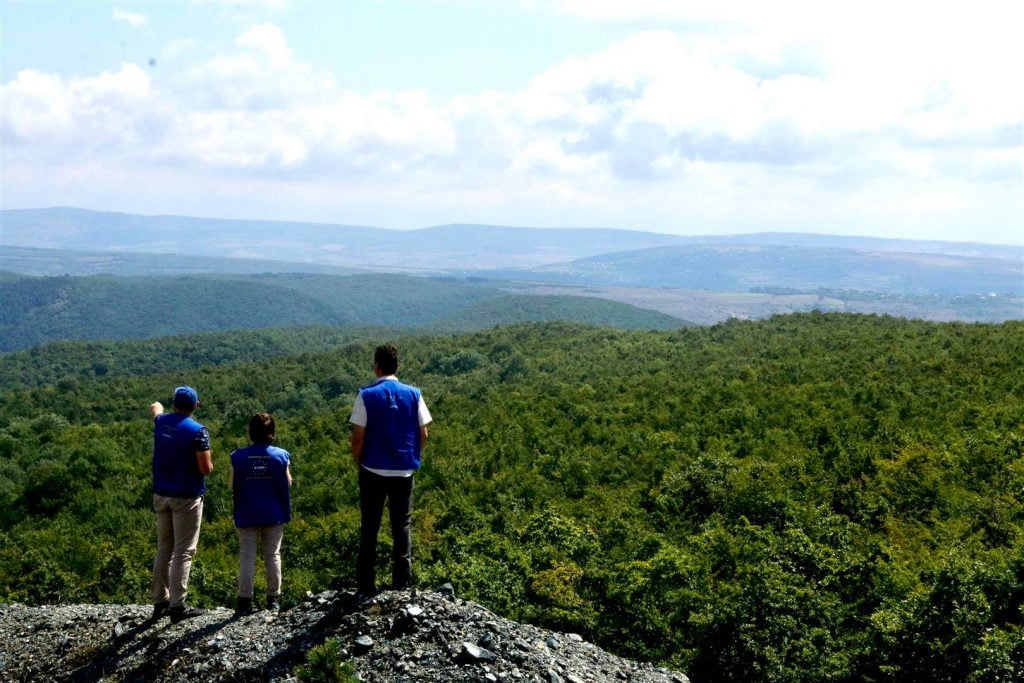Security officials from Tbilisi, Tskhinvali and Russian Federation held a “technical meeting” in occupied village of Tsnelisi, to discuss the escalation around the Georgian police checkpoint at the edge of the occupation line, between the villages of Chorchana of Khashuri Municipality and Tsnelisi.
Speaking after the meeting, Kakhaber Kemoklidze, chief of staff of Georgia’s National Security Council it took place in quite a constructive atmosphere,” and that all the participants agreed that steps should be made to deescalate. According to Kemoklidze, de-facto officials said they have “never intended to speak the language of ultimatums.”
Kemoklidze told the journalists gathered in Chorchana that “the issue of removing the checkpoint was not discussed at today’s meeting,” and that yet another technical meeting will be held early next week – this time in the village of Ergneti, south to the capital of occupied Tskhinvali Region/South Ossetia, where IPRM meetings usually take place.
“Despite the difference in opinions that we, the representatives of the central [Georgian] government and the de-facto Tskhinvali have, the overall pathos of the meeting and its goal was aimed at [ensuring] full deescalation of the situation,” Kemoklidze said, adding that Georgian police are “protect security environment on ground,” not “undermine it.”
Deputy Director of the Analytical Department of the State Security Service of Georgia, Irakli Antadze explained that despite the “diametrically opposed” opinions, the participants of the meeting showed “certain signs of readiness to continue dialogue in a constructive manner.”
Deputy Interior Minister Vladimer Bortsvadze also noted that they “explained” to Tskhinvali representatives and “convinced” them that the only goal of Georgian police was indeed to ensure security on the ground. Bortsvadze also said that he could not hear from de-facto officials the arguments why the Georgian police checkpoint should be re-located. “The checkpoint remains here and our police will continue ensuring security as they did it on previous days,” he concluded.
Tskhinvali position unchanged
Local media cited Anatoly Bibilov, the Moscow-backed leader of Tskhinvali as saying their position remains unchanged, and Tbilisi should remove the police checkpoint. He said the “security committee” was ordered to build a similar checkpoint in Tsnelisi village “so that the people in this village feel safe.”
They also reported that people had gathered in the center of Tsnelisi awaiting the results of today’s meeting. Bibilov met with local population on August 28 as well. He then promised, that “to ensure overall stability and security,” Tskhinvali will build checkpoints “whenever necessary, and as many as necessary.” “No one will manage to violate the border…our people will be secure,” he said.
Also on August 30, de-facto Tskhinvali parliament issued a statement, saying Georgia’s actions constitute “an open act of aggression, aimed to destabilize military-political situation in the region.”
“Supporting Georgia in its provocative actions, the United States and NATO have direct responsibility for the attempts to undermine peace and stability in the Caucasus,” the statement reads, adding “any provocations, violating the territorial integrity of the South Ossetia, will be countered by all the available means, including by use of force.”
Sokhumi also chimed in today, calling in a statement on Tbilisi to refrain from “provoking conflict,” as well as from any steps “that might lead to escalation of the situation in the region.”
EUMM monitors present on the ground
The European Union Monitoring Mission (EUMM) reported earlier today that its monitors “are maintaining a constant, 24 hour presence” at the Administrative Boundary Line (ABL) in the Chorchana/Tsnelisi area, “with a view to monitoring the situation and reduce tensions.”
“Today, the Head of Mission, Mr. Erik Høeg, has also visited the area to assess the situation. The Mission-managed Hotline is being actively used to exchange information between all actors and to reduce the potential for inadvertent escalation,” it stated.
Read also:
30/08/2019 – Foreign Ministry Concerned by ‘Mobilization of Military Equipment, Personnel’ near Occupation Line
30/08/2019 – Georgian Officials Say Situation around Disputed Police Checkpoint ‘Stable’
30/08/2019 – IPRM Meeting ‘Disrupted’ as Tskhinvali Demands Removal of Georgia Police From Chorchana/Tsnelisi Area
This post is also available in: ქართული (Georgian) Русский (Russian)

